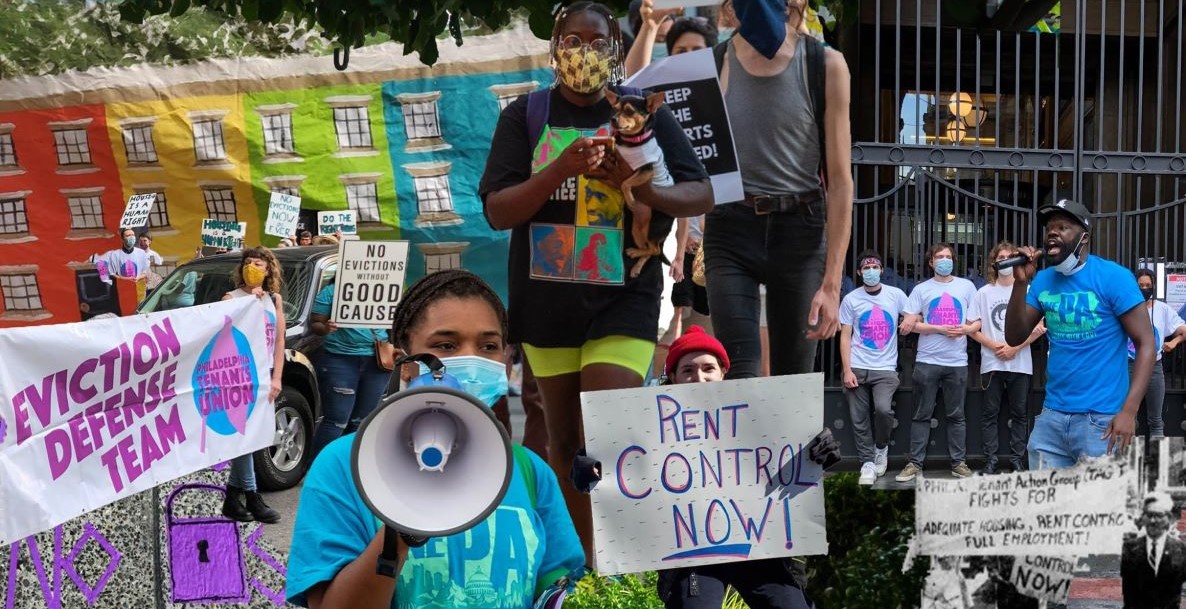This month in 1947, Philadelphia instituted citywide rent control — leading the country in one of the first municipal policies to keep people in their homes. We can learn from this buried history that for those just a few generations ago, rent control was not only expected, but demanded. City Council listened and supported it unanimously. As many face too-high rents and too-low pay, and as a new City Council prepares to take office next year, Philadelphia can and should institute rent control once again in 2024.
Today, out-of-control rent spikes are leaving too many Philadelphians merely surviving, fighting to get to the next first of the month to be able to stay in their homes. The rollback of pandemic-era protections is hitting Black communities in Philadelphia the worst — 52 percent of whom are renters — particularly Black women, who are evicted at higher rates. These evictions put both our livelihoods and safety at risk, as recent shootings carried out by Landlord Tenant Officers show. Rent stabilization is an important guard for both our community’s safety and against criminalization.
While some may dismiss rent control as unrealistic, we can learn from our own city’s example last century to show that this is possible, and, in fact, was once expected. Municipal rent control originally came to be because federal rent control, instituted in select cities during wartime, was rolled back. But 76 years ago, Philadelphians wouldn’t accept that. They rallied against the decision and called on City Council to pass rent control. Although the measure passed unanimously, it was later overturned in 1955, when the Pennsylvania Supreme Court declared it void. Ever since, Philadelphia has been an open market for real estate speculation — and as many can testify, in recent years rents have spiked out of control.
Last year, the City of Philadelphia’s average rent was nearly 20 percent higher than it had been in 2018, while the average hourly wage was only 2.5 percent higher. And since at least 2006, about half of our city’s residents are rent-burdened, disproportionately Black and Brown Philadelphians — meaning they spend a third or more of their income on rent. With this backdrop, landlords have the power to double and triple the rent on their tenants, legally, and they’re using that power to overcharge and push out people from their homes and neighborhoods.
Rent stabilization is an important remedy to correct this power imbalance between tenants and landlords. This policy, together with other efforts for economic justice like raising wages and creating good jobs, is an essential step to ensure that Philadelphians can stay in their homes.
To be sure, critics of rent control will argue that it will hurt the economy and small landlords. That’s simply not the case. It’s important to note that most rental housing in Philadelphia is not owned by small landlords: Corporate landlords own more than half of the city’s rental units. That means when rents are hiked up astronomically, people are paying for a company’s profits instead of the wellbeing of their neighborhoods. And to be clear, rent stabilization still allows landlords to raise rents a reasonable amount — around 3 to 5 percent — to cover costs. Landlords that treat their tenants fairly can help keep neighborhoods stable — benefitting homeowners as well — and help keep money in Philadelphia instead of flowing to out-of-state and international investors.
Today, as in 1947, Philadelphians are organizing to win rent stabilization. As other cities with successful rent control policies have proven, implementing this policy in Philadelphia can help keep housing costs stable for all residents. In March, City Council held its first-ever hearing on rent control, where residents testified that they are constantly fighting against rent increases and being forced out of their neighborhoods. We will have a new City Council and Mayor next year, who should lead on introducing rent stabilization legislation.
Towards this end, the Philadelphia Rent Control Coalition is organizing a series of community forums in each City Council district to connect with our neighbors and elected officials. We invite you to come out on Saturday, September 9 from 1 to 3pm at St. Jude’s Baptist Church, in West Philadelphia at 632 N. 38th Street.
The housing crisis in Philadelphia does not need to be this way. Our forebears demanded more 76 years ago, and made City Council listen so everyone would have a safe and stable place to come home to. We can and must do the same today.
Karen Harvey is the Director of the Philadelphia Rent Control Coalition.
The Citizen welcomes guest commentary from community members who represent that it is their own work and their own opinion based on true facts that they know firsthand.
![]() MORE ON HOUSING CRISIS SOLUTIONS FROM THE CITIZEN
MORE ON HOUSING CRISIS SOLUTIONS FROM THE CITIZEN



